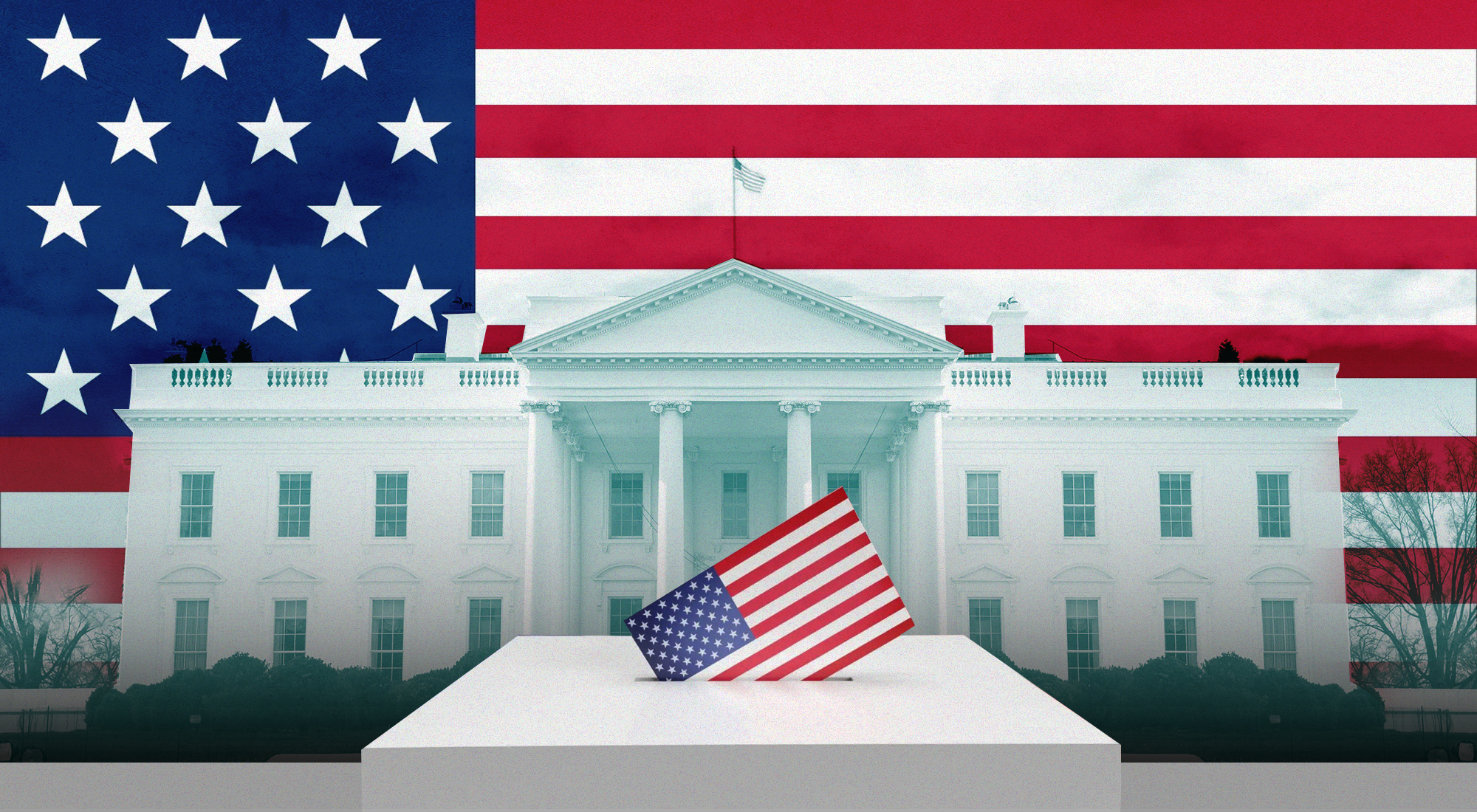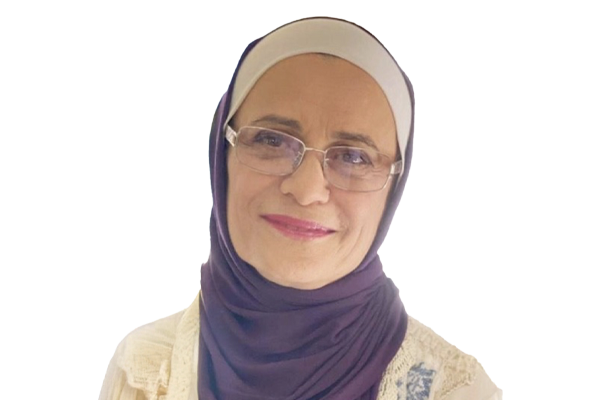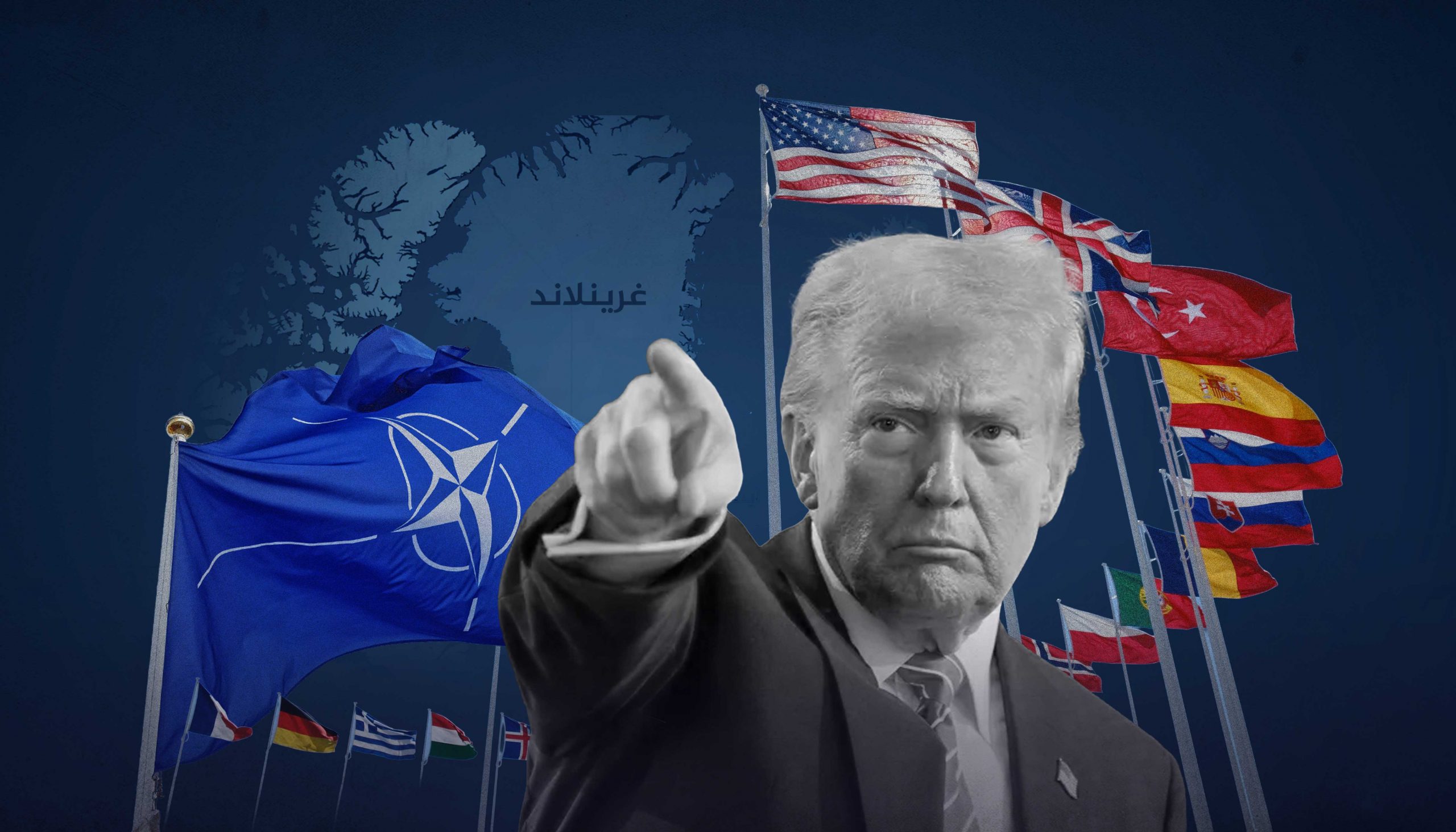Images of long queues of American voters outside polling stations in early November were circulated worldwide. Statements by U.S. politicians on various topics were noted, commented on, quoted, and shared through every available communication platform in our modern digital age, which is simultaneously experiencing an unsettled political and security situation.
In the eyes of many, the U.S. presidential elections are not only for Americans, as their outcome will echo across the globe and influence foreign policies, international alliances, and economic strategies. The winner’s name would decide the course of many global issues and pressing problems, ranging from wars and conflicts to freedoms and rights.
Initially, it was unclear how many states would vote blue or red, and the results of the 2024 American presidential race were expected to be announced a few days after voting. It was a neck-and-neck contest between the Republican candidate, former President Donald Trump, and the Democratic candidate, current Vice President Kamala Harris. However, the counted votes began indicating the winner just a few hours before some balloting centers closed in the eastern part of the United States.
The rest of the world was still watching—some with smiles and a sense of relief, others with raised eyebrows and wide-open eyes. When the results were announced, and Donald Trump was re-elected for a second term, many inside the U.S. and abroad burst into joy, while others shed tears of loss and sadness.
Tears among some Arabs were out of fear—fear of more pain and suffering in a region reeling under political turmoil, military conflicts, and wars. Part of this they blamed on a U.S. foreign policy they saw as biased toward Israel and against Arabs, compounded by severe economic challenges.
Yet, many responded that Trump’s forthright personality could be a positive factor, despite what many describe as his “chaotic” style in making decisions.
The Preference for a Republican
Though Kamala Harris has not been tested by Arab countries as a president, political experts suggest that part of the Arab welcome of Trump’s victory, especially in Gulf countries, stems from a general preference for seeing a Republican in the White House. A Republican is often perceived as “friendlier” to the oil- and gas-rich Arab region, where the relationship has maintained for decades a business-oriented nature, particularly in the energy sector. Accordingly, more bilateral agreements are anticipated.
Gerald Feierstein, Director of the Arabian Peninsula Affairs Program and Distinguished Senior Fellow on U.S. Diplomacy at the DC-based Middle East Institute, explained: “With Donald Trump, there is an additional issue. I think the fact that Trump is a businessman makes many Arab Gulf leaders more comfortable because they feel that they understand him, that he operates in a way that they are comfortable with.” Such a reciprocal understanding made Trump “somebody who they [Gulf leaders] can do business with, and in that sense, they are happy,” added Feierstein, a veteran diplomat who served in the U.S. Foreign Service for 41 years, achieving the personal rank of Career Minister before retiring in 2016. Feierstein’s career included postings in Saudi Arabia, Oman, Lebanon, Palestine/Israel, Tunisia, and Yemen.
During his first term (2017–2021), Trump, along with his son-in-law Jared Kushner—who served as a senior advisor to the president—spent considerable time working closely with Gulf region leaders and prominent figures in both the public and private sectors. Other political scientists echoed expectations of further strengthening of ties between the traditional allies, the U.S. and Arab Gulf states, compared to the Biden Administration.
“Relations were better under Trump the first time [his presidential term],” said Matthew Ingalls, Chair of the Department of International and Middle Eastern Studies at the American University in Dubai (AUD). Despite “his faults,” Trump prioritized personal relationships with leaders. “He likes to focus on his own charisma, and how he is able to get things done, and how he leverages this to make deals, especially military deals,” Ingalls added.
After his inauguration as the 45th U.S. president, Trump chose Saudi Arabia as the destination for his first foreign visit in May 2017. His itinerary also included stops in Israel, the Palestinian territories, Brussels, the Vatican, and Sicily. At the start of the visit, the White House announced a multi-billion-dollar arms deal with Saudi Arabia. The agreement, “worth $350 billion over 10 years and $110 billion to take effect immediately,” was hailed by the White House as a “significant expansion of the security relationship” between the two countries.[1] “Saudi Arabia is the primary destination for U.S. arms sales,” noted a CNBC report, citing the Council on Foreign Relations (CFR), “with the Kingdom purchasing nearly 10 percent of U.S. exports from 2011 to 2015.”[2]
Both the United Arab Emirates and Qatar are also among the Arab countries on the list of American arms buyers. However, economic relations and arms deals between the U.S. and Arab Gulf states have have generally experienced fluctuations under both Democratic and Republican administrations, with periods of ebb and flow particularly evident under Democratic leadership.
For example, the Democratic Biden administration lifted in October 2023 the limits on the sale of offensive weapons to Saudi Arabia, which had been imposed as a way to pressure the kingdom to wind down its war against the Houthis in Yemen. Two months later, the U.S. administration announced its approval to sell weapons worth $2.1 billion to both Saudi Arabia and the UAE. The $1 billion sale to Saudi Arabia includes Hellfire and Sidewinder missiles, along with artillery, tanks, and machine guns, while the $1.2 billion arms deal with the UAE includes GMLRS guided-rocket systems, long-range ATACMS missiles, and training and support for both systems.[3]
Moreover, CNN reported that in the first month of 2024, the U.S. quietly reached an agreement to extend its military presence at Al Udeid Air Base, located in the desert southwest of Doha, for another ten years. The report, citing several U.S. defense officials, noted that the base is home to 10,000 American troops.[4]
On another front, a senior UAE official was quoted by Reuters in September 2024 as saying the Gulf state does not expect to reopen F-35 fighter jet talks with the U.S., regardless of the outcome of the U.S. presidential elections. The F-35 deal had been signed off by Trump just days before he left the White House in 2021. However, the UAE suspended talks with the Biden administration at the end of the same year after failing to reach an agreement on the terms of the deal.
“Technical requirements, sovereign operational restrictions, and cost/benefit analysis led to the reassessment at that time, and those considerations underpin our ongoing position,” the senior official was quoted as saying. The UAE has long sought the F-35, considered the most advanced fighter jet, built with stealth technology. If the U.S. had approved the transfer, the Gulf state would have become the second in the Middle East to operate F-35s, after Israel.[5]
Both the UAE and Israel signed an agreement, mediated by the U.S., to normalize their bilateral relations in mid-September 2020. Bahrain also signed a similar agreement on the same day, in what became known as the “Abraham Accords.” Some American officials were, and still are, trying to include Saudi Arabia in the accords, but many political scientists argue that this will be very difficult given the ongoing Israeli wars on Gaza and Lebanon.
Saudi Arabia, for its part, has consistently linked signing an agreement with Israel to resolving the 76-year-old Palestinian issue and ensuring Palestinian rights. Its leading role in the Islamic world is a significant factor that Riyadh takes into account, explained Feierstein. “I don’t think the Saudis can move forward with normalization without jeopardizing their broader interests. So, I think this is one area where there may be some differences between what Donald Trump expects and what the reality may be.” The kingdom finds it challenging to formalize an agreement with Israel as long as hostilities in Gaza and the West Bank persist and the Palestinian question remains unresolved.
In the past few years, several steps of rapprochement were undertaken following the Abraham Accords between Israel, the UAE, and Bahrain. After Saudi Arabia granted Israel flyover rights within its airspace, the kingdom further opened its airspace in July 2022 to all civilian air traffic bound to or from Israel. In September 2023, Saudi Arabia also hosted the Israeli Minister of Tourism, marking the first public visit by an Israeli minister to the kingdom.
However, this direction reached a dead end in October 2023. Recently, Saudi Foreign Minister Prince Faisal Bin Farhan Al Saud stated at a conference in Riyadh that the issue of normalization is off the table for now until the Palestinian statehood issue is resolved, describing it as “the moral thing to do” and a step that will serve “the security and strategic interests of Israel.” He added, “I would say that it is not just the issue of normalization with the kingdom that is at risk. I would say that the security of the region as a whole is at risk if we do not address the rights of the Palestinians.” A Palestinian state, he emphasized, is the gateway to focusing on the future, as well as on cooperation and integration.[6]
It is still too early to assess Trump’s foreign policy in his second term. It also remains unclear if he will visit the Gulf region to further cement the strong foundation of bilateral relations he established during his first term. During a visit to Riyadh a few years ago—widely seen at the time as a symbolic gesture toward repairing U.S.-Saudi ties—Trump attended a summit of more than 50 Arab and Muslim leaders, including the six nations of the Arab Gulf Cooperation Council (GCC). At the summit, he delivered a speech pledging closer ties with the Middle East to combat terrorism and encourage economic development. The summit also addressed the growing Iranian influence in the region.
This was only the second time a U.S. president had delivered a speech in the Arab world in a decade. In 2009, former Democratic U.S. President Barack Obama gave a speech in Cairo, where he “called for understanding and acknowledging some of America’s missteps in the region.” His speech was denounced by many Republicans and criticized by several of America’s Middle East allies as “a sort of apology,” according to press reports.[7]
During the final years of Obama’s presidency, relations between Washington and Gulf capitals underwent a “period of differences of opinion,” mainly due to the nuclear deal reached between Iran and several world powers, including the five permanent members of the UN Security Council, Germany (known as P5+1), and the European Union (EU). Another contentious issue was the war in Yemen.[8]
In May 2018, Trump announced the U.S. withdrawal from the 2015 nuclear deal with Iran, “unraveling the signature foreign policy achievement of his predecessor Barack Obama, isolating the U.S. from its Western allies and sowing uncertainty before a risky nuclear negotiation with North Korea.”[9] This move paved the way for further sanctions on Iran, which Trump accused of “destruction and chaos.”
Geography and Politics
Many new realities have emerged, and positions have shifted between the Arab Gulf states and their eastern Persian neighbor across the Arabian Gulf between Trump’s first and second terms.
For instance, when Israel considered attacking Iranian targets in response to an earlier missile attack launched by Tehran against it, three Arab Gulf states with a recent history of disputes with Iran—UAE, Saudi Arabia, and Bahrain—expressed their “neutrality in the bilateral Israeli-Iranian confrontation and their determination not to take sides in any way,” wrote Hussein Ibish, Senior Resident Scholar, in an article posted on the website of the Arab Gulf States Institute in Washington, DC.[10] Israeli fighter jets used U.S.-controlled airspace over Iraq for the attack, prompting Baghdad to file a complaint with the UN over the use of its airspace by Israel to strike Iran.[11]
Political scientists in the region expect the new U.S. administration of Donald Trump to increase pressure on Iran to end its military nuclear ambitions. However, they hope such pressure will not escalate into military conflict or war. During Trump’s first presidency, his appointment of the hawkish John Bolton as national security advisor for nearly 17 months gave the impression that Washington might go to war with Iran. Bolton, a hardline Republican, would “love nothing more than a war with Iran,” noted Ingalls.
Describing Iranian-U.S. relations over the past 45 years, Ingalls said, “It is not a war, but it is not a positive relationship either. It is something between a war and a peaceful solution, closer to the war side… I suspect that will continue, and Trump will ramp up pressure to end Iranian nuclear ambitions wherever those may be.”
However, analysts doubt that Arab Gulf states would fully support an anticipated American pressure campaign against Iran, given recent steps toward rapprochement between the Gulf states and Iran. “If Donald Trump thinks that he can go back to the maximum pressure campaign, that he is going to rebuild the coalition between Israel and the Gulf States against Iran, that, in my view, is not going to happen,” said Feierstein.
Many Gulf states have taken steps toward normalizing their relationships with Iran and have made it clear they do not want to be drawn into a potential U.S.-Iran conflict or Israeli-Iranian war. Another important geopolitical factor in the region is that countries like the UAE, and Egypt have officially joined the BRICS group along with Iran. At the same time, political experts note that Arab Gulf states remain “suspicious about the U.S. commitment to their security—a sentiment that started when Trump was still in the White House and hasn’t improved since.”
Arab Gulf states are becoming “much more independent in terms of how they deal with Russia, as well as how they deal with China, and they are much more assertive in pressing their own interests even if that means taking positions against U.S. preferences,” Feierstein added. On the other side, Iran is adopting new reconciliatory approaches with its neighbors.
During his first speech as Iran’s president, Masoud Pezeshkian told the UN General Assembly that he wants to open a “constructive” chapter in his country’s international relations. He added, “We are ready to engage with participants of the 2015 nuclear deal. If the deal’s commitments are implemented fully and in good faith, dialogue on other issues can follow.”
Gulf leaders, including the UAE’s President Sheikh Mohamed bin Zayed and Saudi Crown Prince Mohammed bin Salman, may push to align American policy more closely with Gulf states’ approaches to Iran, Feierstein noted. Whether Trump will follow this path remains to be seen. However, analysts agree that the 47th President of the U.S. enjoys more flexibility than his predecessor, Joe Biden. With Republicans controlling the majority of Senate seats, they are unlikely to challenge Trump, enabling him to pursue policies that Biden could not.
Arab American Vote
American analysts, columnists, and politicians are attempting to understand the reasons behind the outcome of the 2024 elections, the unexpected relatively weak performance of the Democrats, and the factors driving the shift of most states, including swing states, to the right. Many swing states, including Georgia, North Carolina, Wisconsin, and Michigan, moved to the right and gave their votes to Trump.
Despite his “endless tangents in his speeches,” the fact that voters chose Donald Trump can be attributed to the alignment of their frustrations with the “Make America Great Again” (MAGA) movement and the Republican Party. “Unhappy voters with the nation’s direction turned him into a vessel for their rage,” noted a U.S. press report. MAGA was the slogan Trump introduced during his first presidential campaign. A T-shirt featuring his mugshot became a best-seller during the election campaign. Other popular T-shirts and hats prominently displayed Trump’s face alongside the phrase: “I am voting for the convicted felon.”
According to National Public Radio (NPR), more than $10 billion was spent on advertisements during the 2024 elections[12]—up $1 billion from the figure four years ago.
One clear outcome is that Harris lost significant support from Arab-American and Muslim-American voters, who expressed frustration and anger over how the Biden administration handled Palestinian and Lebanese suffering, particularly its perceived lack of action to address it. Biden was criticized for offering full support to Israel in its wars, a stance many found troubling.
It remains to be seen how the election outcome will influence U.S. policy in the Middle East and whether any immediate changes will occur. Both Trump and Harris have expressed strong support for Israel, but there have been some rhetorical differences between them.
When Arab Americans hear U.S. officials say, “We must defend Israel,” they ask, “Who is defending the Palestinians?” “So, you feel for the oppressed, but you are sitting, watching, and funding it. This is a hypocrisy of all hypocrisies,” said Dr. Ahmad Jaddallah, an obstetrician and gynecologist based in Ohio. Dr. Jaddallah is also a member of the Akron Palestine Solidarity Collective, which works to promote awareness of the injustices faced by the Palestinian people.
Last August, during the Democratic National Convention in Chicago, Harris’s campaign rejected demands to allow a Palestinian-American speaker to address the convention. The campaign also turned down a request from the “Uncommitted” Movement—founded during the Democratic primaries to pressure Biden to halt unconditional support for Israel—to include their concerns. This rejection came just a day after the convention featured the parents of an Israeli-American hostage held by Hamas in Gaza. In response, leaders of the “Uncommitted” Movement organized a sit-in outside the convention center. These developments highlighted the growing “cracks” within the Democratic Party. Notably, Cook County—home to Chicago and the convention—hosts the largest Palestinian-American population in the country.[13]
Another key city for Arab Americans is Dearborn, Michigan, often described as the de facto center of Arab-American political and financial power. During his campaign, Trump visited Dearborn, but Harris did not. Instead, she met with a group of “handpicked” Arab and Muslim leaders in Flint, about an hour north of Detroit. Harris’s decision to campaign in Michigan alongside neoconservatives like Liz Cheney and her father, Dick Cheney, was seen by many Arab Americans as dismissive of their communities, given Dick Cheney’s role in wars that deeply impacted the region over past decades.[14]
“This year, Arab-American efforts were more organized than before, but there is still a lot of work to do,” commented Dr. Jaddallah. “Our demands are for our country to follow international and humanitarian law and to respect the international law, which they are not doing.”
Referring to a televised moment where John Kirby, the White House National Security Communications Advisor, was seen crying over Ukrainian casualties, Jaddallah remarked, “American officials can cry on television screens over the murder of Ukrainian children, because Russia bombed schools and hospitals and children were killed, yet they are okay with it and say it happens in war when Israel does it. They can’t have it both ways. And it’s our (American) weapons that are being provided and used on top of that.”
Israel’s war on Gaza has left tens of thousands dead, most of them women and children, thousands of children orphaned and injured, nearly two million displaced, and caused massive destruction to the city that will take decades and billions of dollars to rebuild. Among the communities that showed support for Arab Americans in their advocacy were “Jewish brothers and sisters,” who offered “the loudest voices speaking up for Palestinian rights and for humanity,” said Jaddallah. “When they say justice, they mean justice for everyone, and when they say ‘never again,’ that means for everyone.”
[1] CNBC. “US, Saudi Arabia Seal Weapons Deal Worth Nearly $110 Billion as Trump Begins Visit.” May 20, 2017. https://www.cnbc.com/2017/05/20/us-saudi-arabia-seal-weapons-deal-worth-nearly-110-billion-as-trump-begins-visit.html.
[2] Ibid.
[3] Fortune. “US Weapons Sales to UAE, Saudi Arabia Include Hellfire, Sidewinder, ATACMS, GMLRS.” October 12, 2024. https://fortune.com/2024/10/12/us-weapons-sales-uae-saudi-arabia-hellfire-sidewinder-atacms-gmlrs/.
[4] CNN. “US, Qatar Agreement Includes Largest Base in the Middle East.” January 2, 2024. https://edition.cnn.com/2024/01/02/politics/us-qatar-agreement-largest-base-middle-east/index.html.
[5] Reuters. “UAE Does Not Plan to Reopen F-35 Fighter Jet Talks with US, UAE Official.” September 14, 2024. https://www.reuters.com/business/aerospace-defense/uae-does-not-plan-re-open-f-35-fighter-jet-talks-with-us-uae-official-2024-09-14/.
[6] YouTube. “Trump Delivers Speech to Arab Muslim Leaders Summit.” Accessed November 18, 2024. https://youtu.be/hHmRs3iAGgM?si=-7dw_uIGm6LuPbri.
[7] PBS NewsHour. “Watch Live: Trump Delivers Speech to Arab Muslim Leaders Summit.” Accessed November 18, 2024. https://www.pbs.org/newshour/politics/watch-live-trump-delivers-speech-arab-muslim-leaders-summit.
[8] Al Jazeera. “Trump Arrives in Saudi Arabia on First Foreign Trip.” May 20, 2017. https://www.aljazeera.com/news/2017/5/20/trump-arrives-in-saudi-arabia-in-first-foreign-trip.
[9] The New York Times. “Trump Withdraws U.S. from Iran Nuclear Deal.” May 8, 2018. https://www.nytimes.com/2018/05/08/world/middleeast/trump-iran-nuclear-deal.html.
[10] AGSIW. “Gulf Countries Seek to Avoid Getting Drawn into the Israel-Iran Confrontation.” Accessed November 18, 2024. https://agsiw.org/gulf-countries-seek-to-avoid-getting-drawn-into-the-israel-iran-confrontation/.
[11] The National News. “Iraq Complains to UN over Israel Using Its Airspace to Attack Iran.” October 28, 2024. https://www.thenationalnews.com/news/mena/2024/10/28/iraq-complains-to-un-over-israel-using-its-airspace-to-attack-iran/.
[12] NPR. “2024 Election Ad Spending: Trump and Harris.” November 1, 2024. https://www.npr.org/2024/11/01/nx-s1-5173712/2024-election-ad-spending-trump-harris.
[13] Associated Press. “Uncommitted Palestinian Convention Questions Harris.” November 1, 2024. https://apnews.com/article/uncommitted-palestinian-convention-harris-918812eb0e19b9669f8b9b9cd88c6360.
[14] Al Jazeera. “‘We Warned You’: Arab Americans in Michigan Tell Kamala Harris.” November 6, 2024. https://www.aljazeera.com/news/2024/11/6/we-warned-you-arab-americans-in-michigan-tell-kamala-harris.








